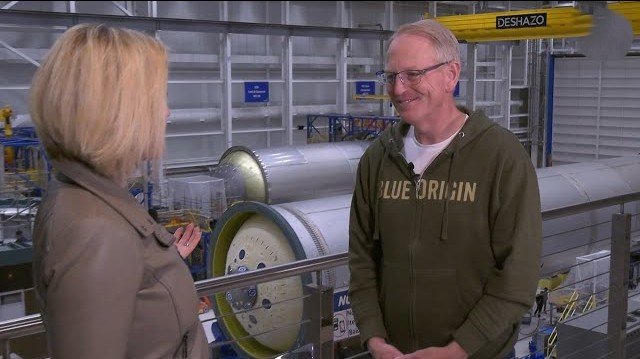Inside Blue Origin: A Decade in the Making, New Glenn Set to Revolutionize Space Access
In a milestone moment a decade in the making, Blue Origin is on the cusp of a transformative achievement. Conducting this rare interview inside the company’s state-of-the-art rocket factory, we explore the groundbreaking work behind New Glenn, the reusable rocket poised to redefine space access and challenge industry titans.

A Factory Like No Other
“This is an actual rocket factory,” Dave, a senior executive at Blue Origin, explained, gesturing to the bustling production floor behind him. “You’re looking at the main floor where we build the boosters and the second stage. Booster number two is here, while booster number one is already out on the pad. Currently, we have seven or eight second stages in various stages of production.”
The factory itself is a marvel—a machine designed to make machines. By increasing production rates and maintaining high-quality standards, the facility epitomizes innovation and efficiency. “Our goal is to build rockets quickly and affordably,” Dave added, showcasing the company’s relentless focus on scalability and precision.
Automation and Integration
Blue Origin’s approach to rocket building is as automated as it is pioneering. “The feeder shops are highly automated,” Dave explained. “We’ve reimagined rocket manufacturing to cut costs. This requires significant vertical integration. We produce our own valves, batteries, and avionics in-house, and the final assembly of boosters is also largely automated.”
Scaling Production for New Glenn
As New Glenn approaches operational status, Blue Origin has ambitious plans. “We aim to produce up to 48 second stages per year, although it will take a few years to reach that rate,” Dave noted. With reusable boosters, the company anticipates needing fewer boosters annually, potentially building just three to four per year.
High Stakes for Bezos’ Vision
The first launch of New Glenn carries profound significance. “Our goal is to build a road to space by lowering the cost of access,” Dave emphasized. With thousands of employees contributing over the past seven to eight years, the success of New Glenn would mark a monumental achievement.
The mission’s ambition doesn’t stop at achieving orbit. “We’re also attempting to land the vehicle on a barge. Successfully recovering the booster would be the icing on the cake,” Dave remarked.
Betting on Reusability
Reusability lies at the heart of Blue Origin’s strategy, a critical factor in its business model. “Even if the first landing isn’t successful, we’ll figure it out,” Dave said, pointing to the company’s success with the New Shepard tourism rocket as proof of their persistence.
Entering a Competitive Market
The introduction of New Glenn is set to shake up a space launch industry dominated by SpaceX. “The space market is large enough for multiple successful players,” Dave observed. “As prices drop, innovation and demand will rise. This isn’t just about competition; it’s about expanding what’s possible in space.”
Broader Implications for Blue Origin
The ripple effects of New Glenn extend beyond launches. “Lowering payload costs to low Earth orbit and the moon is crucial,” Dave explained. “This positions us to support commercial space stations, lunar landers, and other projects that make space exploration more accessible.”
Expectations from the Trump Administration
Blue Origin remains optimistic about space policy under the incoming administration. “The first Trump Administration supported space significantly, with initiatives like the Space Force and NASA contracts,” Dave said. “We expect this momentum to continue.”
Navigating SpaceX’s Influence
When asked about Elon Musk’s potential sway in Washington, Dave struck a diplomatic tone. “Elon has said his involvement is for the public good, not personal gain. I take him at his word,” he commented, expressing confidence in the industry’s collaborative future.
Building a Road to Space
Blue Origin’s mission is grand in scope. “We aim to build a road to space, enabling light industry on Earth and relocating heavy industry off the planet,” Dave stated. The company’s focus on cost-efficient engines and boosters is paving the way for new applications and industries in space.
The Question of Outside Investment
As for opening Blue Origin to external funding, the decision rests with Jeff Bezos. “Jeff is deeply involved in our day-to-day operations,” Dave noted. “Any decisions about outside investment would come from him.”
Lessons from Amazon
Dave’s transition from Amazon to Blue Origin has brought valuable insights. “My experience at Amazon taught me the importance of efficiency and customer-centric innovation,” he said. These principles are now helping to build a foundation for the future of space exploration.
The Road Ahead
As New Glenn prepares for its maiden flight, the stakes couldn’t be higher. This launch is not just a test of technology but a demonstration of vision—Jeff Bezos’ vision of a future where space is accessible and industry thrives beyond Earth.
With reusable rockets, automated factories, and an ambitious long-term mission, Blue Origin is charting a course toward a new era in space exploration. The launch of New Glenn may be just the beginning, but it signifies the culmination of a decade of dedication, innovation, and relentless pursuit of progress.
